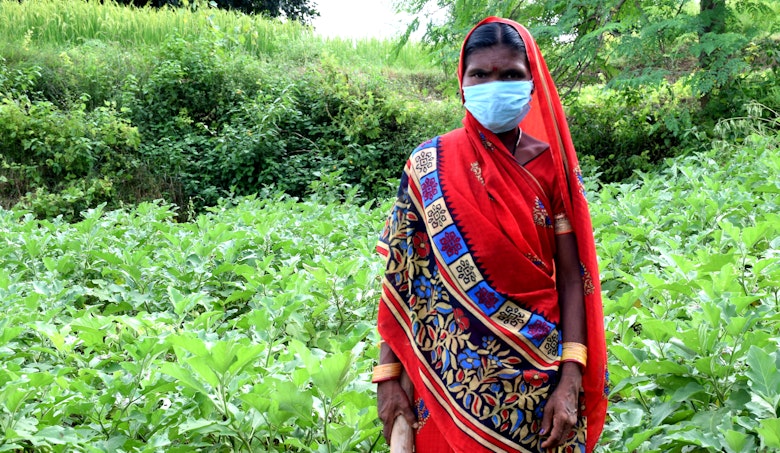Devi’s Self-Cultivated Happiness
Our source of livelihoods often depends on the opportunities that we have. Some have more, some have less, and some may not know about them.
Meet Vimla Devi, a 28-year-old mother of three in Jharkhand, India. Her family resides at the beginning of the mica supply chain where picking Mica was the main source of many families’ livelihoods. The family was completely dependent on collection of mica scraps for a living. They could not make very gainful income from the agro based initiatives. They were very poor and found it hard to survive. The children did not go to anganwadis or schools, they engaged as child labourers in collection of mica scraps. In this environment, many children and families do not have many opportunities for a better future.
“It was tough to engage my children along with me in picking the Mica scraps. I was sacrificing their future” Vimla said
Due to prevalent legal restrictions on mica mining, this source of livelihood had pushed back socio-economic conditions very hard and that too with no additional/alternative provisions. All these had led to below par outcomes on all the aspects of aspired quality of life. Due to lack of additional income opportunities and labour exploitation in the mica industry, the family income was extremely low, with barely means to survive.
As a result, children became victims of child labour due to poverty. They did not have access to education.
Terre des Hommes Netherlands in India supported project staff who identified Vimla and other 11 poverty-stricken families in the village. They were organised to constitute a ‘Self Help Group’ for socio-economic empowerment, in coordination with existing government institutions. The underlined aim was to facilitate additional sources of livelihoods that would positively affect the well-being of children and enhance quality of life of the entire family.
Vimla was trained on cropping practices for vegetable cultivation and desired intercultural practices for optimum yield. In these training sessions, she learned about the types and varieties that are high in market demand and common practices needed for vegetables to be grown.
She received an input support of 3,000 rupees (35 Euros) and put her own contribution of 4,500 rupees (35 Euros). Using the practices that she had learned, she cultivated and harvested tomato, brinjal, green chili, and bitter and bottle gourd. With the help from her husband, she sold these vegetables in the market over a period of 2-3 months. This has resulted in a gross profit of worth 17,100 rupees (195 Euros).
In addition to learning about farming practices, the consultations in the self-help group also covered the topic of providing a better future for children by sending children to school and persuading families not to engage children in picking of Mica scraps.
Vimla’s children now have access to education and are currently learning on digital platforms during the COVID-19 lockdown. She now encourages them to focus on academic learning and only requests for some of their support in cultivating her vegetables. She said, “I would like to see my children back to the centers and schools as soon as they re-open”.
The Improvement of Livelihood
Her family is now out of poverty and their livelihood has improved. As a result, children have stopped engaging in child labour and mining. Vimla has found a source of additional income and gainful employment in sustainable vegetable cultivation. Her dependence on mica collection has stopped while her technical knowledge in agriculture has greatly increased.
The Self-Help Groups have ensured the socio-economic development of the entire community.“The collective efforts on the part of the self-help group members will keep all of us in good stead to move ahead in addressing contemporary development needs”, said Vimla.
Vimla is very emphatic to mention, “I will continue to plant my vegetables to provide for my family and hopefully, we will continue to be happy”. She relishes the dream to see her children are well educated and to have a better life.

